Janelle Monáe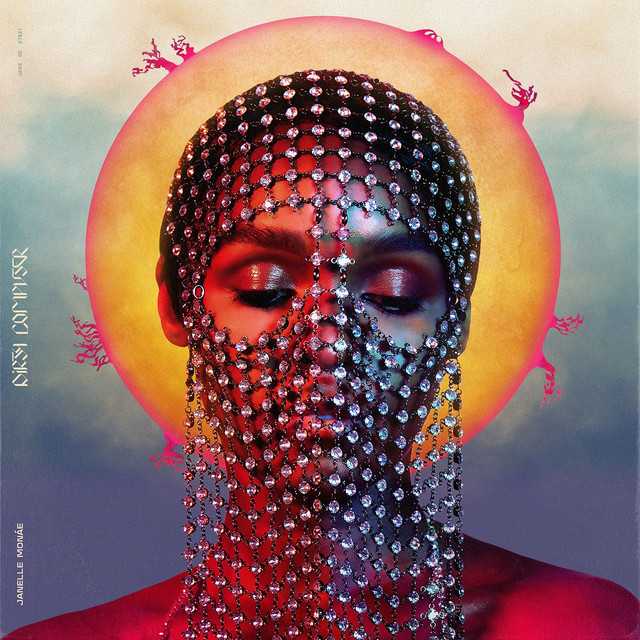 | ||
| Allmusic Biography : Grammy-nominated singer, songwriter, arranger, producer, and actor Janelle Monáe left her mark on 2010s R&B; with an energized retro-futuristic sound wrapped in theatrical science fiction concepts. After she spent years grinding away in the Atlanta underground, Monáe capitalized on support from OutKasts Big Boi and developed into one of the most dynamic artists of her time, fusing soul, funk, hip-hop, and new wave -- among other genres -- with a spirited approach that seemed to treat entertainment and art as indivisible. She and her fellow Wondaland associates likewise stressed singles as much as albums. "Tightrope" and "Django Jane" provided bold jolts, while The ArchAndroid (2010), The Electric Lady (2013), and Dirty Computer (2018), all complex full-lengths, elaborated upon themes of oppression, identity, and liberation as they related to race and sexuality. Growing up, Janelle Monáe Robinson felt constrained by the limited resources offered in her greater Kansas City, Kansas environment. When she finished high school, she moved to New York to attend the American Musical and Dramatic Academy with the intention of pursuing musical theater. After performing in a couple off-Broadway shows and encountering a lack of desirable roles, she opted to try her luck in Atlanta. She soon joined a band and toured the local college circuit, where she eventually got in touch with her future partners in Wondaland Arts Society -- a collective and label that looked to promote experimental arts -- and recorded The Audition, which she financed, released, and distributed in a run of a few hundred copies. OutKasts Big Boi included two of the songs from the set, the Off the Wall-styled "Lettin Go" and an electro version of DeBarges "Time Will Reveal," on his 2005 compilation Got Purp?, Vol. 2. Robinson also appeared on OutKasts 2006 soundtrack, Idlewild, and was in the video for "Morris Brown." Robinson made her proper solo debut in August 2007 with an EP entitled The Chase, the first of four planned "Metropolis suites" based in the year 2719 with a character named Cindi Mayweather as the protagonist. Its mix of cabaret, soul, hip-hop, and new wave was well received and found a fan in Sean "Diddy" Combs. Rumors about a signing were finally confirmed in March 2008, when Combs announced Robinson as the newest member of his Bad Boy roster. Robinson promised that the move wouldnt compromise any of her artistic integrity or creativity, and a re-release of The Chase, featuring bonus content, followed shortly thereafter. The second and third suites of Metropolis were issued together as components of The ArchAndroid. Released in May 2010, the album debuted at number 17 on the Billboard 200 and resulted in the first of several Grammy nominations for Robinson, including Best Contemporary R&B; Album and Best Urban/Alternative Performance, the latter for lead single "Tightrope." After Fun.s number one pop hit "We Are Young," featuring Robinson, was nominated for multiple Grammy Awards, Robinson returned in September 2013 with The Electric Lady. Billed as Metropolis suites four and five, it was even more expansive than the preceding full-length -- Prince, Erykah Badu, Esperanza Spalding, Solange, and Miguel were among the guests -- and entered the Billboard 200 at number five. Robinson then moved the Wondaland label to Epic and launched the partnership with Wondaland Presents: The Eephus, a various-artists EP featuring her "Yoga" and, more significantly, Jidennas platinum single "Classic Man." On tour in support of the EP, Robinson and her band performed the anti-police brutality song "Hell You Talmbout," not included on The Eephus but released separately as an instrumental. Occupied with acting roles in two of the biggest films of 2016, the award-winning Moonlight and Hidden Figures, Robinson recorded intermittently, including but not limited to a part in the multi-artist charity recording "This Is for the Girls," songs for the Hidden Figures soundtrack, and a contribution to Jidennas The Chief. She also collaborated with Grimes and recorded "Hum Along and Dance (Gotta Get Down)" for the Netflix series The Get Down. In April 2018, she released her third album, the frolicsome yet defiant Dirty Computer. The comparatively pop-oriented album was previewed with "Django Jane" and "Make Me Feel," the latter of which added Julia Michaels and Justin Trantor to Robinsons list of studio collaborators. | ||
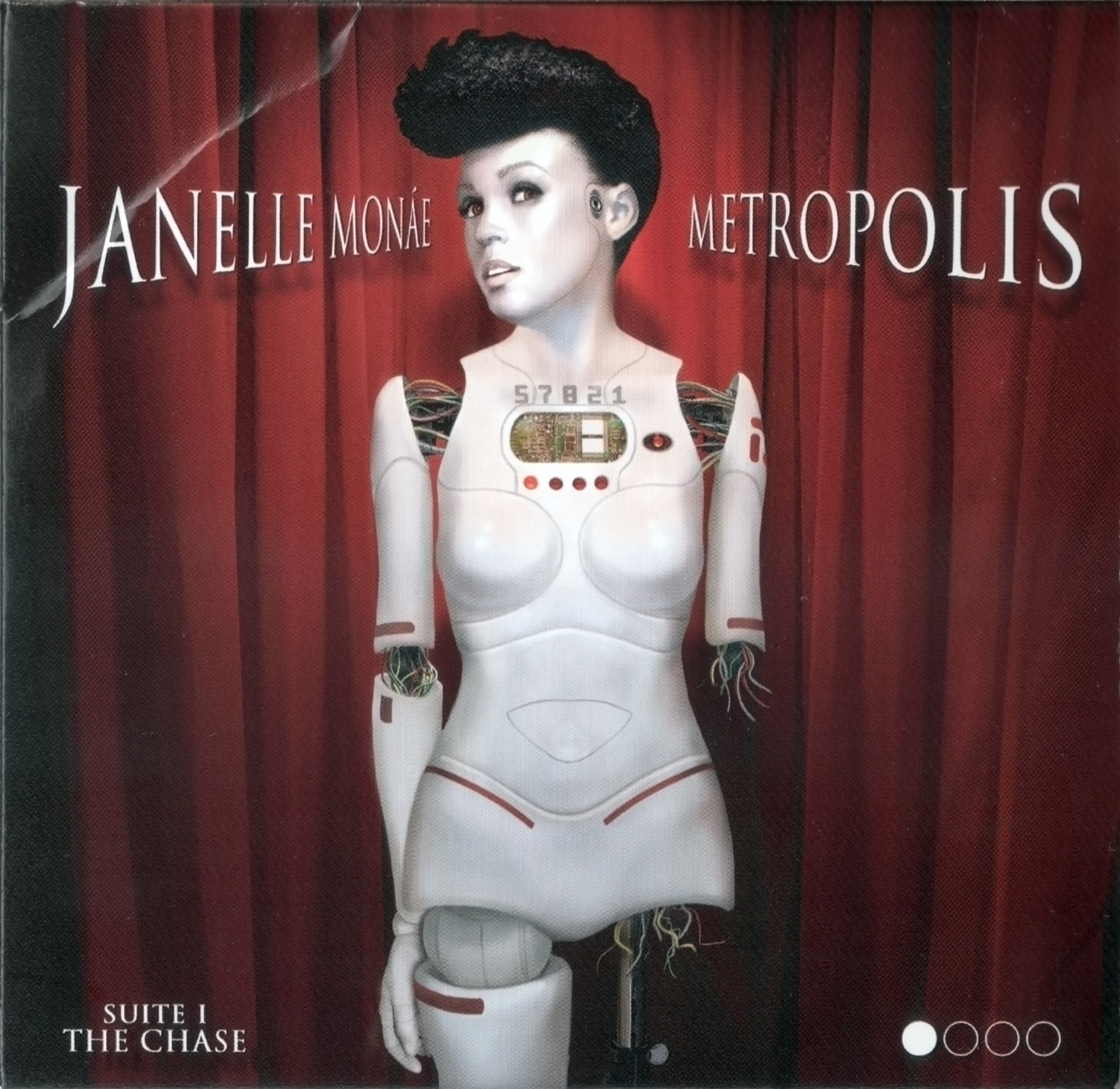 | Album: 1 of 5 Title: Metropolis: The Chase Suite Released: 2007-08-24 Tracks: 8 Duration: 29:22 Scroll: Up Down Top Bottom 25% 50% 75% Spotify AlbumCover | 1 The March of the Wolfmasters (01:27) 2 Violet Stars Happy Hunting!!! (03:13) 3 Many Moons (05:27) 4 Cybertronic Purgatory (01:35) 5 Sincerely, Jane. (05:31) 6 Mr. President (04:59) 7 Smile (03:58) 8 Violet Stars Happy Hunting! (The Jetsons mix) (03:09) |
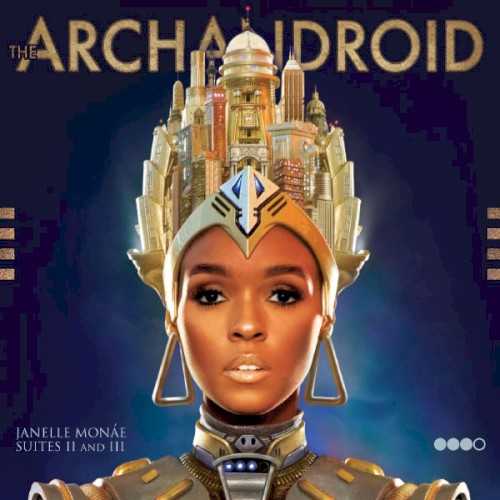 | Album: 2 of 5 Title: The ArchAndroid Released: 2010-05-17 Tracks: 18 Duration: 1:08:37 Scroll: Up Down Top Bottom 25% 50% 75% Spotify TrackSamples Allmusic AlbumCover | 1 Suite II Overture (02:31) 2 Dance or Die (03:12) 3 Faster (03:19) 4 Locked Inside (04:16) 5 Sir Greendown (02:15) 6 Cold War (03:23) 7 Tightrope (04:22) 8 Neon Gumbo (01:37) 9 Oh, Maker (03:47) 10 Come Alive (The War of the Roses) (03:22) 11 Mushrooms & Roses (05:42) 12 Suite III Overture (01:41) 13 Neon Valley Street (04:11) 14 Make the Bus (03:19) 15 Wondaland (03:36) 16 57821 (03:16) 17 Say You’ll Go (06:01) 18 BabopbyeYa (08:47) |
| The ArchAndroid : Allmusic album Review : Any misgivings about Janelle Monáes Bad Boy deal are nullified by the briefest contact with this, an extravagant 70-minute album involving more imagination, conceptual detail, and stylistic turnabouts than most gatefold prog rock epics. Credit Bad Boys Diddy for allowing Monáe to fully explore the singularity on display through Metropolis, Suite I: The Chase, and work with her Wondaland crew on a bigger budget. The ArchAndroid not only picks up where The Chase let off, but contains both the second and third Metropolis suites in one shot with no discernible “let’s make some hits now” intervention. The packaging alone -- the elaborate crown, the inspiration listed beside each song, etc. -- provides much to process. Liner notes from the vice-chancellor of the arts asylum at the Palace of the Dogs, Monáe’s residence, outline the (possible) situation fleshed out in the songs. In short, Monáe was genoraped in the 28th century, sent back to the 21st century, and had her organic compounds cloned and re-purposed for the existence of ArchAndroid Cindi Mayweather, whose directive is to liberate Metropolis from a secret society of oppressors. Understanding all this stuff enhances the enjoyment of the album, but it is not required. A few tracks merely push the album along, and a gaudy Of Montreal collaboration is disruptive, but there are numerous highlights that are vastly dissimilar from one another. “Tightrope,” the biggest standout, is funky soul, all locomotive percussion and lyrical prancing to match: “I tip on alligators, and little rattlesnakers/But I’m another flavor, something like a Terminator.” Just beneath that is the burbling synth pop of “Wondaland,” as playful and rhythmically juicy as Tom Tom Club (“So inspired, you touch my wires”); the haunted space-folk of “57821” (titled after Monáe’s patient number); and the conjoined “Faster” and “Locked Inside,” packing bristling energy with a new-wave bounce that morphs into a churning type of desperation worthy of Michael Jackson. Monáe might not have much appeal beyond musical theater geeks, sci-fi nerds, and those who like their genres crossed-up, but no one can deny that very few are on her creative level. She can sing, sang, and scream like hell, too. | ||
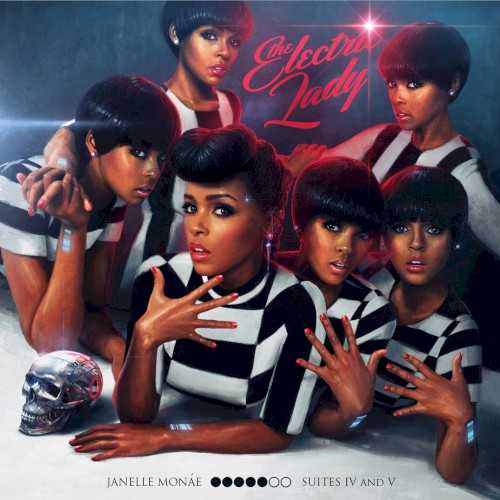 | Album: 3 of 5 Title: The Electric Lady Released: 2013-09-09 Tracks: 23 Duration: 1:23:22 Scroll: Up Down Top Bottom 25% 50% 75% Spotify TrackSamples Allmusic Wikipedia AlbumCover | 1 Suite IV Electric Overture (01:37) 2 Givin Em What They Love (04:26) 3 Q.U.E.E.N. (05:10) 4 Electric Lady (05:08) 5 Good Morning Midnight (interlude) (01:22) 6 Primetime (04:40) 7 We Were Rock & Roll (04:19) 8 The Chrome Shoppe (interlude) (01:10) 9 Dance Apocalyptic (03:25) 10 Look Into My Eyes (02:18) 1 Suite V Electric Overture (02:20) 2 It’s Code (04:05) 3 Ghetto Woman (04:46) 4 Our Favorite Fugitive (interlude) (01:23) 5 Victory (04:12) 6 Can’t Live Without Your Love (03:54) 7 Sally Ride (04:08) 8 Dorothy Dandridge Eyes (04:15) 9 What an Experience (04:57) 10 Q.U.E.E.N. (Wondamix) (05:23) 11 Electric Lady (Dungeon–Wondamix) (03:46) 12 Hell You Talmbout (03:41) 13 I Want You Back (02:48) |
| The Electric Lady : Allmusic album Review : Prince, Erykah Badu, Esperanza Spalding, Solange, and Miguel contribute to the fourth and fifth Metropolis suites, but its not as if Janelle Monáe and her Wondaland associates were short on creative energy. Equally as detailed and as entertaining as The ArchAndroid, The Electric Lady likewise is a product of overactive imaginations and detailed concept engineering, and it also plays out like a sci-fi opera-slash-variety program with style and era-hopping galore. Suite four is the albums busier and more ostentatious half, more star-studded and less focused, highlighted by the bopping "Dance Apocalyptic" and the strutting Badu duet "Q.U.E.E.N." Suite five is considerably stronger with a handful of firmly R&B-rooted; gems. The inspiration for its overture is noted in the liners as "Stevie Wonder listening to Os Mutantes on vinyl (circa 1973)," but shades of Stevies 70s work are heard later in more obvious ways. "Ghetto Woman" is impeccably layered soul-funk, fluid and robust at once, with chunky percussion and synthesizer lines bounding about as Monáe delivers a performance as proud and as powerful as Stevies "Black Man." It contains an autobiographical 30-second verse that is probably swift and dense enough to make early supporter Big Boi beam with pride. The enraptured liquid glide of "Dorothy Dandridge Eyes," featuring Spalding, recalls "I Cant Help It," co-written by Stevie for Michael Jacksons Off the Wall. Earlier, on "Its Code," Monáe channels the yearning Jackson 5-era MJ. "Cant Live Without Your Love," presumably a paean to human love interest Anthony Greendown has Monáe -- or Cindi Mayweather, aka Electric Lady Number One -- yearning like never before. The album is sure to astound Monáes sci-fi/theater-geek following. Its second half cannot be denied by those who simply value creative R&B; that owes to the past and sounds fresh. Anyone can appreciate the phenomenal interludes, which are close to 3 Feet High and Rising level. Power-up to the Droid Rebel Alliance and the Get-Free Crew indeed. | ||
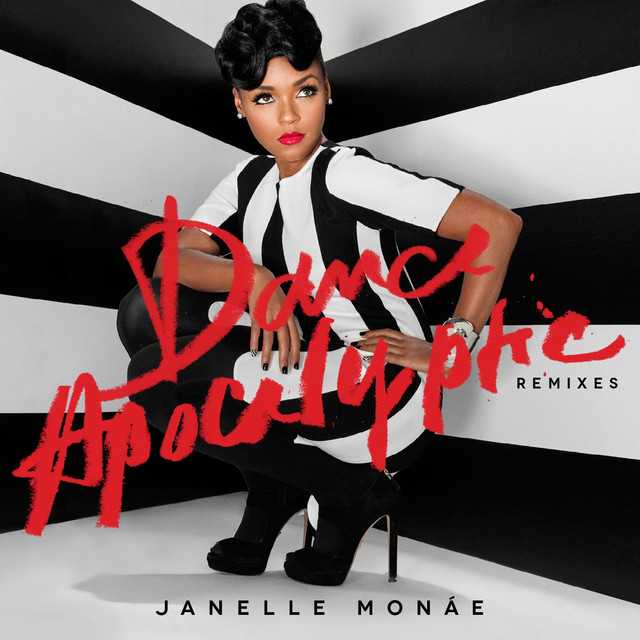 | Album: 4 of 5 Title: Dance Apocalyptic Remixes Released: 2014-03-10 Tracks: 2 Duration: 09:41 Scroll: Up Down Top Bottom 25% 50% 75% Spotify AlbumCover | 1 Dance Apocalyptic (Chocolate Puma remix) (05:32) 2 Dance Apocalyptic (Olugbenga edit) (04:09) |
 | Album: 5 of 5 Title: Dirty Computer Released: 2018-04-27 Tracks: 14 Duration: 48:47 Scroll: Up Down Top Bottom 25% 50% 75% Spotify TrackSamples Allmusic AlbumCover | 1 Dirty Computer (01:59) 2 Crazy, Classic, Life (04:46) 3 Take a Byte (04:07) 4 Jane’s Dream (00:18) 5 Screwed (05:02) 6 Django Jane (03:10) 7 Pynk (04:00) 8 Make Me Feel (03:14) 9 I Got the Juice (03:46) 10 I Like That (03:20) 11 Don’t Judge Me (06:03) 12 Stevie’s Dream (00:46) 13 So Afraid (04:04) 14 Americans (04:06) |
| Dirty Computer : Allmusic album Review : "Yoga" was an ostensibly minor part of the Janelle Monáe discography by the arrival of Dirty Computer. Three years old and outshined by another Wondaland release, Jidennas "Classic Man," it nevertheless became Monáes first single to hit the Billboard Hot 100. That Monáe hadnt previously hit the chart as a headliner was further evidence of a flawed industry, given that she and primary collaborators Nate Wonder and Chuck Lightning had been making songs with pop appeal for nearly a decade. "Yoga" did show that Monáe was more open to messing with contemporary trends. Moreover, the songs humanized, sexually uninhibited, and anti-authoritarian qualities -- she was earthbound, celebrating her body, asserting "You cannot police me" -- also indicated the course she has taken with her third album. Oddly enough, "Make Me Feel," the one Dirty Computer track on which Monáe employs a wholly pop songwriting team including Julia Michaels, Justin Tranter, and Mattman & Robin, is the funkiest and friskiest number here, clearly influenced by the late (and uncredited) Prince. Monáe and her trusty Wondaland partners, the albums dominant creative force, colorfully twist and flip new wave-leaning pop with booming bass drums and rattling percussion. They transmit powerful and defiant jubilance in response to "wack ass fuckboys everywhere (from the traphouse to the White House) who make the lives of little brown girls so damn hard," among dozens of other inspirations Monáe acknowledges in the essential liner notes. Almost every track is densely packed with quotables delivered in approaches that shift from easygoing elegance to hard-fought, triumphant conviction. The latter approach yields the albums apex, "Django Jane," in which Monáe raps throughout with inhuman precision, threatening a pussy riot, declaring "We aint hidden no more," and uplifting the "highly melanated" while dropping some of the sets few sci-fi allusions, "Made a fandroid outta yo girlfriend" among them. Not to be lost in all the power moves are indirect and direct references to a romantic relationship -- another form of dissent -- referenced and explored throughout, from the glowing "Crazy, Classic, Life" through the fiery "So Afraid," the only moment of emotional fragility. While this is easily the most loaded Monáe album in terms of guests, with Brian Wilson, Stevie Wonder, and Grimes among the contributors, theres no doubt that its a Wondaland product. It demonstrates that artful resistance and pop music are not mutually exclusive. | ||